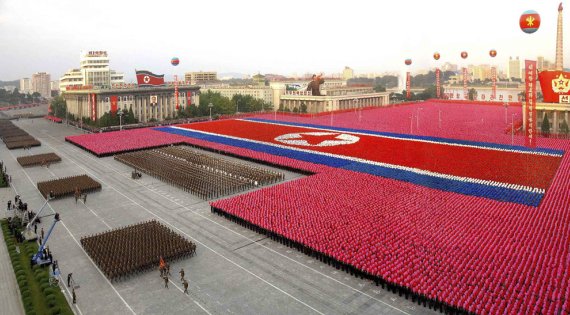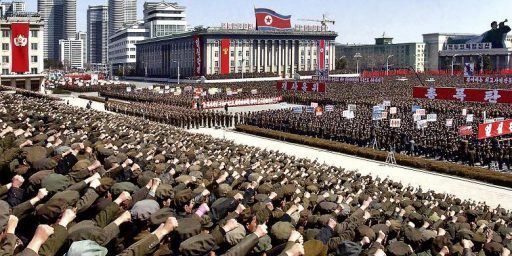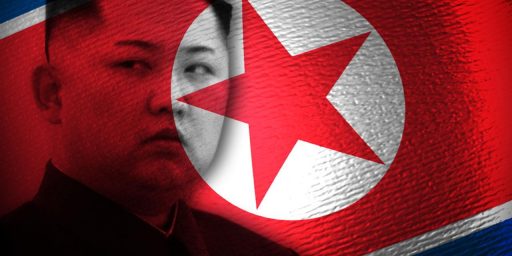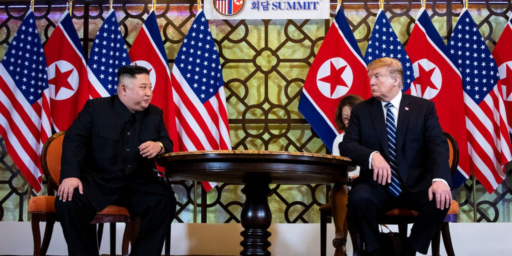Is The World Ready For A North Korean Collapse?
With tensions continuing to rise on the Korean Peninsula and the latest round of talks in China seemingly ending with no real progress, some analysts are wondering if the world is prepared for the effects of a collapse of the Pyongyang regime:
[G]iven the worsening economy, the inexperience of the putative successor and the unknown reliability of the Korean military and security forces in the event of Kim Jong-il’s death, the rest of East Asia should be prepared for a scenario of rapid collapse in North Korea.
What is most worrying about a possible North Korean collapse is that the key players in the region are not talking to each other, even informally, about such an eventuality. It’s almost certain that these powers—China, the United States, Japan, South Korea and, possibly, Russia—have all drawn up their own contingency plans for Pyongyang’s quick collapse. However, they’ve done nothing to explore a collective response to what is without doubt a geopolitical game-changer.
As a result, many crucial questions remain unanswered. For instance, how should the United States and South Korea react if China sends combat troops into North Korea to conduct ‘humanitarian assistance’ missions? In all likelihood, Beijing will be tempted to do so if millions of refugees start fleeing into China. Which country will take the lead in securing nuclear materials? How will China respond to the crossing of the 38th parallel by South Korean and US forces? Who will take the lead in reaching out to Pyongyang’s post-Kim regime? What will be the collective security architecture after the Korean peninsula is reunified?
Bonnie S Glaser and Scott Snyder voice similar concerns:
It is premature to predict near-term regime collapse in North Korea, but it is not too early for major regional parties to plan for the effects of instability, potentially including massive refugee flows and unsecure nuclear weapons, materials, facilities, and knowhow that could be smuggled out of the North and into the hands of the highest bidder. Responses to instability could include decisions by China, South Korea and the US to dispatch troops into North Korea to restore order and to locate and secure weapons of mass destruction facilities. Absent advance coordination, these forces could come into conflict with each other.
(…)
The US cannot afford to let great power politics stand in the way of planning an effective response to North Korean instability; the risks are simply too great. Instead, it should seek to create favorable conditions for the primary parties, namely itself, South Korea, and China, to discuss likely responses to North Korean instability, while keeping its ally Japan informed.
All three governments should be prepared to offer reassurances to reduce the likelihood of miscalculation in the event of instability in North Korea. For example, the US could assure that it would work with the United Nations; would coordinate with China to secure WMD facilities, materials, and expertise; and would not station troops north of the 38th parallel after stabilization and reconstruction operations are completed. At the same time, the allies should seek assurances from Beijing that it would not intervene in North Korea’s domestic political situation to prop up a failing regime and would not obstruct ROK reunification efforts. Moreover, all three nations should agree that their armies would not engage each other in the North, and that no nation would exploit instability in the DPRK as an excuse to threaten any other state.
Given China’s strange relationship with North Korea, it’s hard to know whether this topic has even been hinted at in any of the discussions with the United States and other powers, but if it isn’t, it most assuredly should be. In addition to likely being a massive humanitarian disaster, a sudden collapse of the Kim regime has the potential to be a powder keg that ends with two nuclear powers staring at each other across the 38th Parallel while someone tries to figure out how to deal with the 22 million residents of a former dictatorship.







If North Korea collapses, the most stabilizing solution is a massive Chinese military occupation. South Korea is not crazy enough to take in North in the same matter as West Germany absorbing East Germany. And there is a whole lot of guns pointing at South than the German situation.
China has a vested interested in stopping the great exodus of North Korean refuge into China, and military occupation is pretty much the only way to insure that (crossing the greatest concentration of minefield on Earth known as DMZ on foot is NOT recommended).
It all depends on the thorough-ness of the North Korean collapse. If it’s basically all out, then North Korea would probably end up under Chinese military occupation, with it eventually reverting back to South Korea over time (which is probably what the South Korean government would actually prefer, so they don’t get stuck with the burden of absorbing the North in one blow).
Considering that the Chinese have a large number of forces stationed near the border area, I think this is the most likely outcome. If it became clear that North Korea had either collapsed or decided to go to war, the Chinese would likely invade and occupy the country, before the US-South Korean forces get there first.
The South isn’t eager to get into a war, but if one happened, they could probably defeat the North on their own. Don’t under-estimate the South Korean military. *
* Personally, I’ve always thought that South Korea should acquire nuclear weapons, but that would make getting rid of the North’s weapons via diplomacy impossible.
What’s a collapse? If you mean the Kim family is out, nothing. The rest of the regime will carry on as usual, propped up by the Chinese and, to a lesser extent, South Korea and Japan.
If you mean the entire regime, I think it means civil war which could potentially expand into a regional or even a world war. The members of the present regime don’t have a retirement plan. They plan to hold power forever and will go to substantial lengths to ensure that happens. They’ll fight potential replacement.
The present situation, as I suggested in my earlier post this morning, is brinksmanship. It will persist as long as China, the South, and Japan allow it to.
As suggested by others above what needs to happen is a path to reunification. Blocking that is China’s reason for supporting the Kims but I think it’s probably the only stable outcome.
According to some opinion piece on CNN earlier today that I can no longer find, NK’s economics is relatively stable (and will remain so assuming that China fills the lost trade). I had previously assumed everyone was starving to death, but they’ve had a couple of good crop years. So based on that part of the puzzle, it’s doubtful that the regime’s collapse is imminent.
I think the deal China needs is a demilitarized, unified Korea. South Korean (US) troops on their border is intolerable. We should be working to reassure China that a unified Korea is not a threat. Perhaps a deal for an internationalized border with China. I don’t know how we do it, but China has a legitimate strategic issue and we should find the way to reassure them while finding a way to guarantee Korea’s independence. Not an easy circle to square.